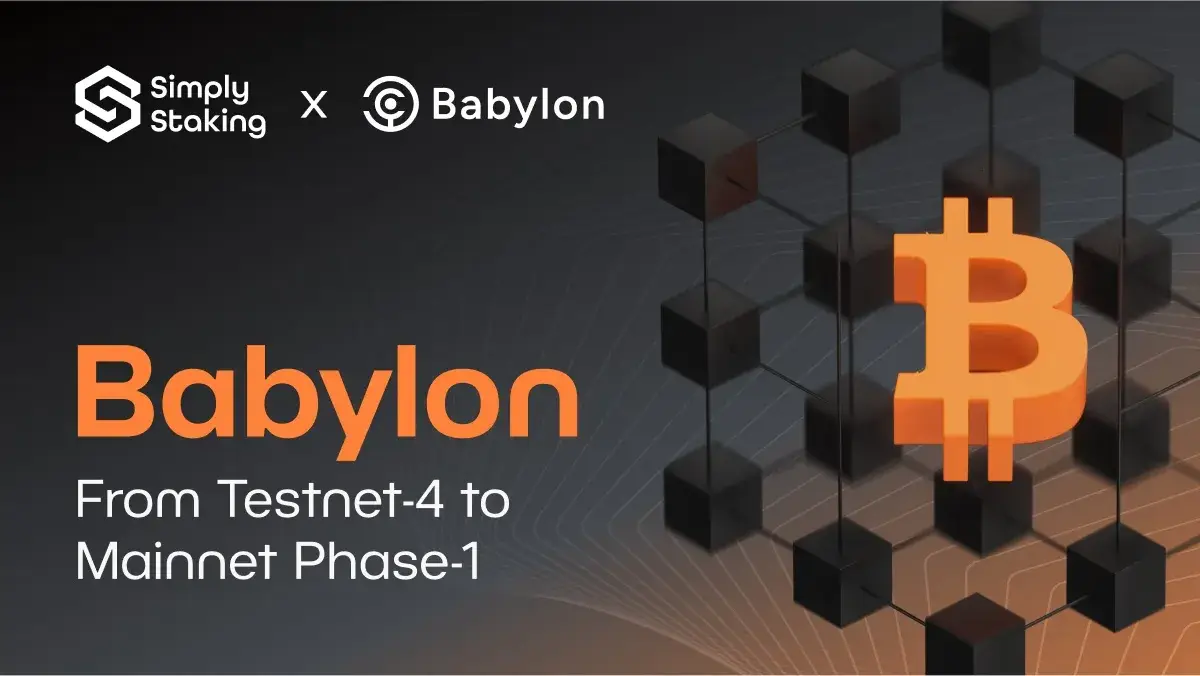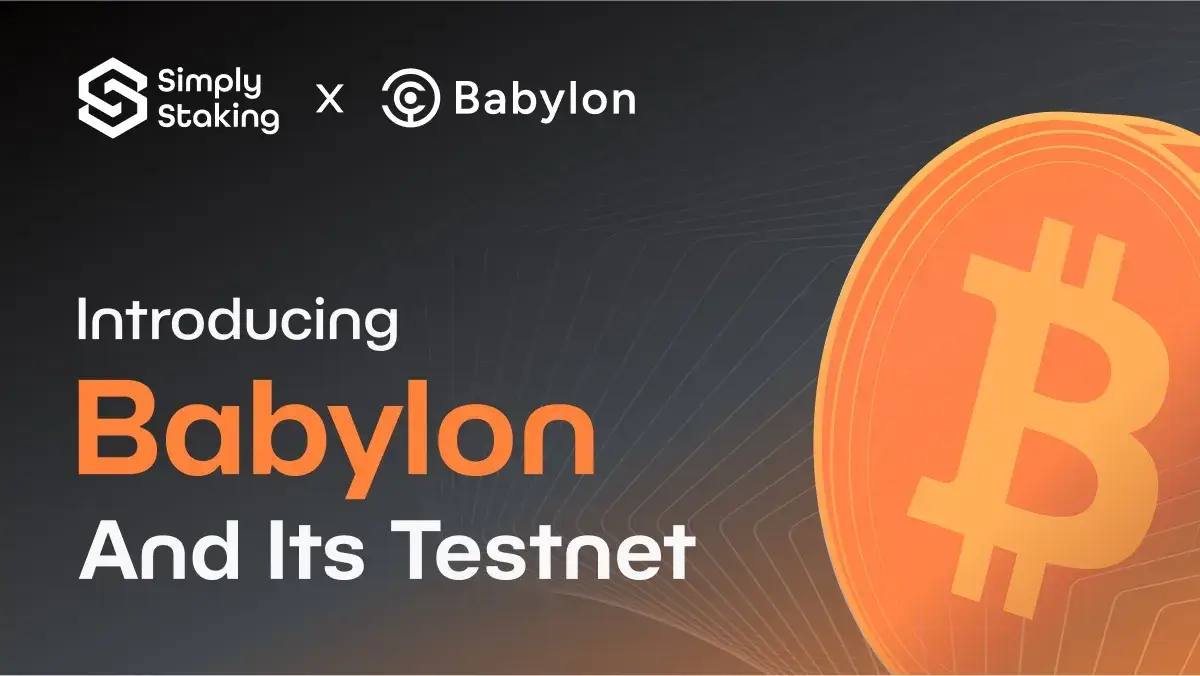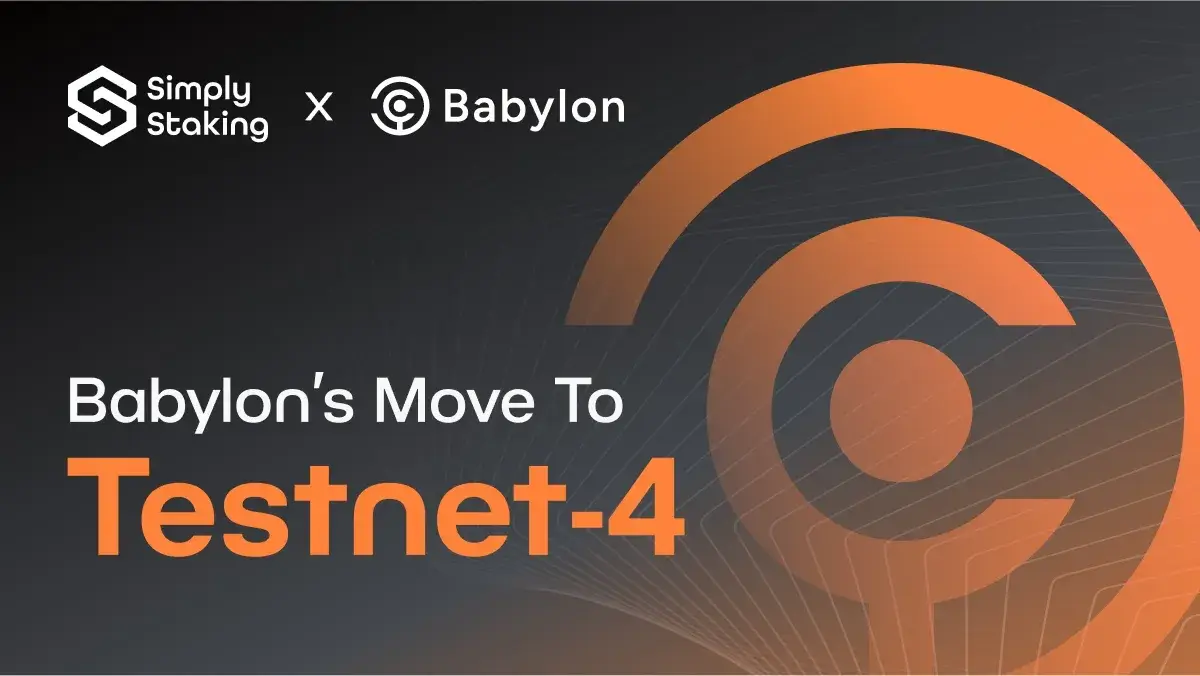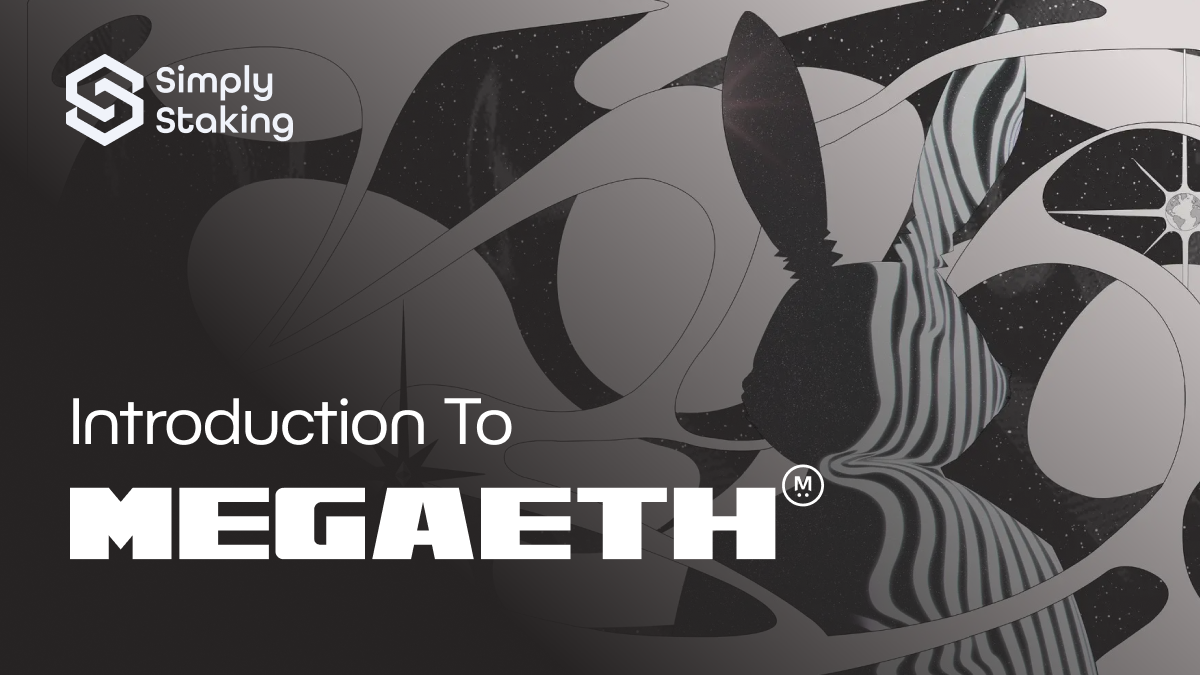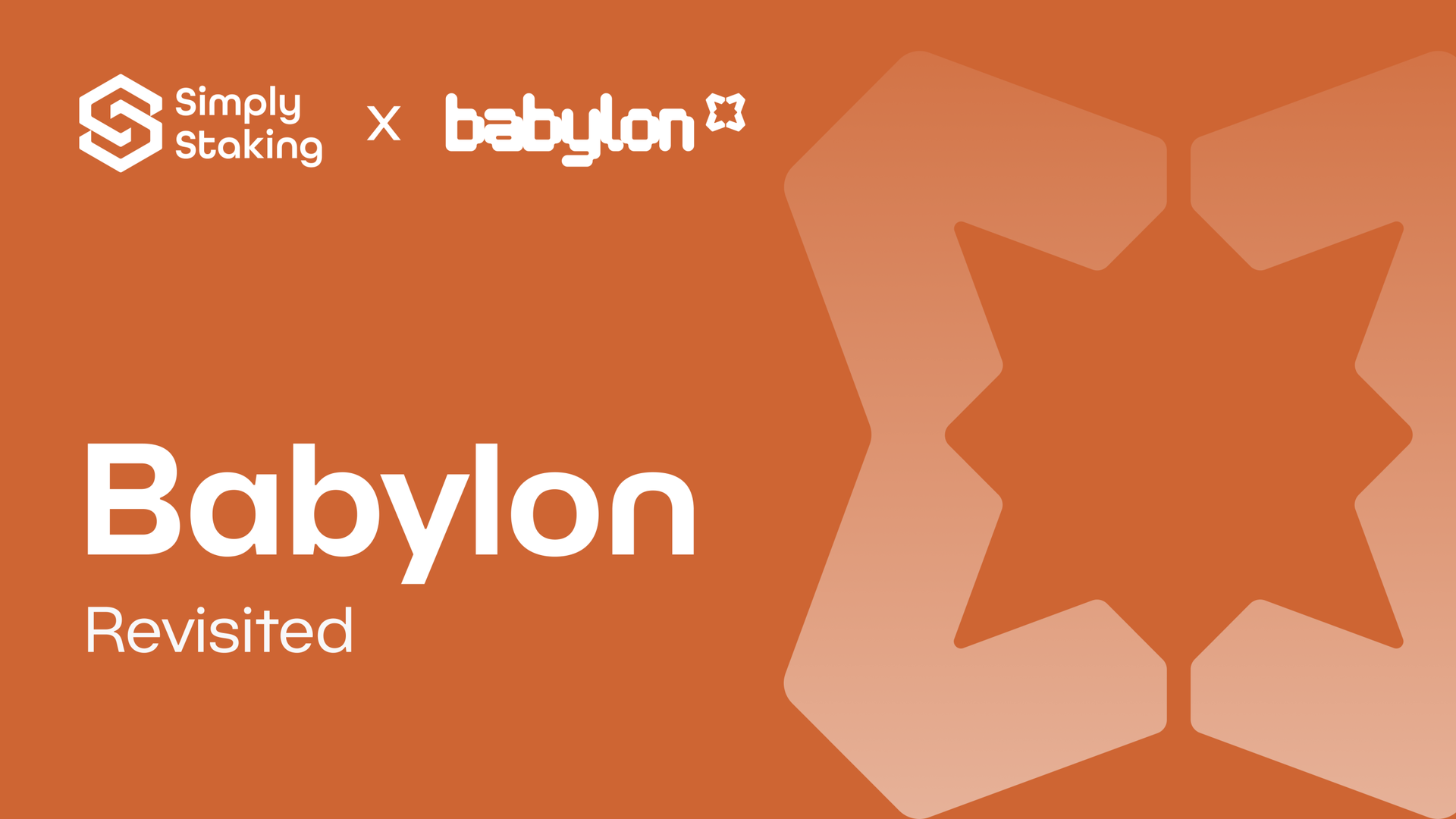While Bitcoin still remains king, it is not BTC’s Proof-of-Work (PoW) consensus that remains the industry standard but rather Proof-of-Stake (PoS) blockchains following Ethereum’s transition known as “the Merge”. Among other things, PoS brought improvements such as higher transaction throughput, faster block times, and lower entry barriers for validators; including the subsequent proliferation of PoS chains and ecosystems of decentralised applications (dApps) that today make up the space of decentralised finance (DeFi). Many of these PoS chains nevertheless face significant challenges related to scalability and security, notably the substantial economic capital required to ensure their security, as validators must hold and stake tokens to participate in the network’s consensus mechanism. Attracting and maintaining sufficient capital for security can be difficult, especially for smaller or newer chains. High inflation rates are often required to incentivise validators, which can undermine the long-term stability and utility of the chain.
You might be interested in these articles:
- What is Babylon Crypto?
- Babylon Staking Guide: How to Stake BABY
- Babylon’s Move from Testnet to Mainnet
- Babylon Staking APR
- BABY Staking
Babylon introduces a novel protocol designed to leverage the vast amount of idle capital in Bitcoin to enhance the security of PoS blockchains through Bitcoin staking—allowing Bitcoin holders to stake their BTC without transferring it to PoS chains, providing full slashable security guarantees and unlocking the economic potential of Bitcoin to secure the PoS ecosystem. By leveraging Bitcoin’s robust security and extending it to PoS chains, Babylon aims to achieve faster finality and greater security to enable PoS-based dApps to thrive without some of the main issues they are currently facing.
In this article, we will explore the problems faced by current PoS blockchains, the solution proposed by Babylon and the technical innovations behind the protocol, various use-cases, as well as mention recent progress of the testnet.
The Problem with Current PoS Chains
Capital Requirements for Security
PoS blockchains are secured by validators who hold and stake tokens, with their stake being slashable if they violate protocol rules. As such, this mechanism relies heavily on economic capital to secure the network, yet attracting and maintaining sufficient capital is challenging, particularly for smaller or new chains. These chains often need to offer high inflation rates to incentivise validators, which can lead to excessive token supply, inflation, and ultimately, a devaluation of the token.
Take the Cosmos ecosystem as an example, where inflation rates can be as high as 20% per year to attract sufficient staking. While this ensures short-term security, it can undermine the long-term growth and stability of the network, making it less attractive for long-term investors.
Economic Security and Centralisation Risks
PoS chains often rely on high inflation rates to incentivise validators to stake their tokens. However, this approach can lead to the dilution of token value, discouraging long-term holding and investment. Furthermore, the accumulation of large token holdings by a few entities can create centralisation risks. When a significant portion of the stake is controlled by a small number of validators, it undermines the network’s decentralisation. This concentration of power can lead to security vulnerabilities, as these entities might collude or be targeted by malicious actors aiming to compromise the network.
Babylon: Extending BTC Security to PoS Chains and Rollups

Babylon’s protocol extends the security of Bitcoin to other blockchains and enhances the functionality of rollups in several significant ways. Here’s how:
Extending BTC Security to PoS Chains
Bitcoin, with its proven security and decentralised nature, provides more than a solid foundation for securing PoS chains. For holders, being able to stake BTC means they can contribute to the security of these chains without having to bridge their assets off-chain. By allowing the extension of Bitcoin security, Babylon offers a novel use case for the “digital gold”, transforming it from a passive store of value to an active means of securing the broader blockchain ecosystem. Adopting Bitcoin’s consensus infrastructure enables PoS chains to improve their security and ensure greater transaction integrity, among other specific benefits, including:
- Fast Unbonding: By leveraging Bitcoin’s security, PoS blockchains can reduce their unbonding periods from weeks to a few hours, enhancing liquidity for stakers.
- Bootstrapping: New PoS chains with low token valuation can benefit from Bitcoin’s security, which can help them gain trust and grow more quickly.
- Protecting Important Transactions: Bitcoin security can be used to protect critical transactions, ensuring they are finalised securely even if they are initially processed quickly.
- Eliminating Weak Subjectivity: Bitcoin timestamps provide an objective measure, removing the need for PoS chains to rely on social consensus, which depends on stakeholders’ subjective judgments.
- Verifying State Sync and Snapshots: Bitcoin timestamps allow users to verify the state of the PoS chain or confirm a snapshot from the P2P network, providing a reliable source of truth.
- Combating Censorship: By posting censored transactions to Bitcoin, Bitcoin timestamping can help fight transaction censorship in PoS chains.
A Two-Sided Marketplace
Babylon’s Bitcoin staking protocol operates as a two-sided marketplace. On one side are PoS chains that need security and are willing to pay yields for it. On the other side are Bitcoin holders who possess capital and seek to earn a return on their holdings. The protocol facilitates this marketplace by matching Bitcoin stakes with PoS chains, managing staking and validation information, and recording finality signatures.
- Bitcoin Timestamping Service: Ensures PoS chains are synchronised with the Bitcoin network.
- Matching Marketplace: Matches Bitcoin stakes with PoS chains and tracks necessary staking and validation information, such as EOTS key registration and refreshment.
- Finality Signatures Recording: Records finality signatures for PoS chains to ensure transactions are securely finalised.
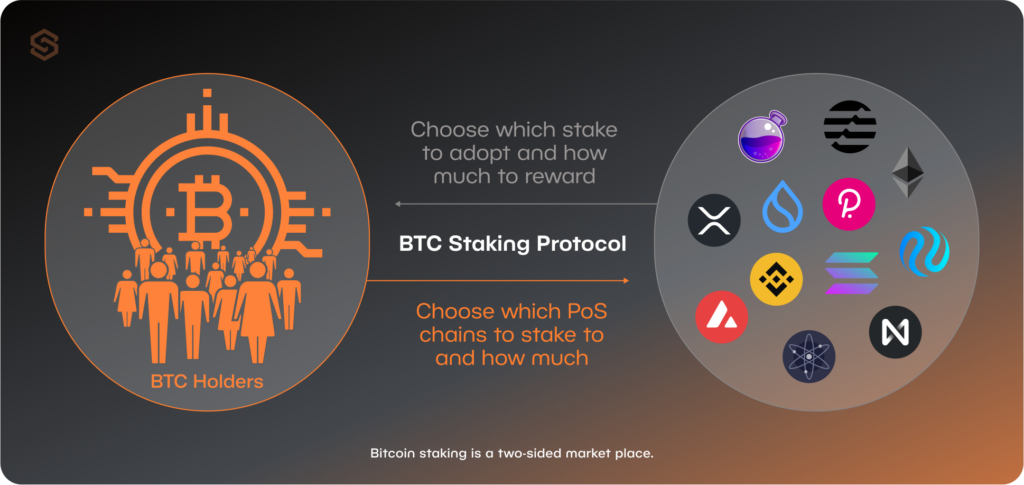
Enhancing Rollups with Bitcoin Staking
Rollups are layer-2 (L2) solutions designed to enhance the scalability of layer-1 (L1) blockchains by executing transactions off-chain while leveraging the security of the L1. However, they face significant challenges related to finality and centralisation risks due to their reliance on a centralised sequencer. Babylon addresses these issues by integrating Bitcoin staking, which offers several key improvements:
Decentralised Sequencer and Reducing Latency with Bitcoin Staking
In current rollups, the sequencer plays a central role by ordering and submitting transactions to the L1 blockchain. Such an approach introduces risks such as forking attacks, where the sequencer could submit different block versions to users and the L1 chain, enabling double-spending attacks and undermining trust.
Babylon’s protocol enhances rollup security by requiring sequencers to lock up BTC as collateral to ensure that if a sequencer attempts a forking attack or other malicious behaviour, their staked BTC can be slashed. A slashing mechanism creates a strong economic disincentive against dishonest behaviour, ensuring faster transaction finality. Users can trust that their transactions are secure without waiting for full L1 confirmation, which can take minutes to weeks in existing systems.
To further enhance security, Babylon proposes decentralising the sequencing role. Instead of relying on a single sequencer, a committee of finality provider nodes collectively validates and signs off on each L2 block before it can be committed to the L1. If the sequencer proposes conflicting blocks, the finality providers that sign both will be slashed. By distributing responsibility across multiple nodes, the risk of centralised attacks is reduced and the overall security of the rollup is improved.
Key Benefits of Bitcoin Staking for Rollups
- Fast Finality & Enhanced Security: The protocol enables faster finality by introducing a slashing mechanism based on Bitcoin staking that disincentivises malicious behaviour, significantly improves security, and protects users from various attacks, including double-spend attempts. Faster finality also makes rollups more suitable for high-stake applications that require rapid transaction confirmation, such as in DeFi and gaming.
- Decentralisation: By distributing the responsibility of finality among multiple finality providers, the solution reduces the centralisation risk associated with a single sequencer, fostering a more decentralised system. While requiring multiple finality providers might increase latency, it offers enhanced security benefits.
- Democratisation: The delegation feature of Bitcoin staking allows a broad spectrum of BTC holders to participate in the rollup’s consensus by delegating their voting power to finality providers. BTC holders can thus contribute to the security of rollups on other chains by delegating and increasing the collateral, earning a yield in return. Such an approach avoids the latency costs associated with a fully decentralised sequencer solution, where a more complex process to agree on each rollup block would inevitably increase finality times.
By integrating Bitcoin staking, Babylon addresses the critical issues of finality and centralisation in current rollup architectures, making these rollups more secure and efficient. Not only can this improve the security and scalability of rollups but also unlock new possibilities for high-value dApps that require strong security guarantees and rapid transaction confirmation.
How Bitcoin Staking Works
For Bitcoin stakers, the protocol works in the following way:
Staking Bitcoin: The process begins with the staker sending a staking transaction to the Bitcoin chain, locking their bitcoin in a self-custodian vault, which creates a UTXO (Unspent Transaction Output) with two conditions:
- Timelock: Allows the staker to use their secret key to withdraw the Bitcoin after a specified period.
- Burn Condition: The UTXO can be burned using a special extractable one-time signature (EOTS). If the stake is delegated, this EOTS belongs to the validator.
Validation on PoS Chain: Once the staking transaction is confirmed on the Bitcoin chain, the staker (or the delegated validator) can begin validating the PoS chain and signing valid block votes with the EOTS secret key. When the protocol is followed correctly, the staker earns yield. The staker can unbond in two ways:
- Wait for the timelock to expire and then withdraw.
- Submit an unbonding transaction to Bitcoin, unlocking the Bitcoin after a few days.
If the staker acts maliciously, such as by attempting double-spending, the protocol exposes the EOTS secret key to the public; allowing anyone to impersonate the staker, submit a slashing transaction on the Bitcoin chain, and burn the staked Bitcoin to ensure that violations are penalised and system integrity is maintained. Hence, the Babylon protocol builds on three security guarantees:

Key Difference with Other Staking Protocols: Unlike something like Cosmos’ Replicated Security and EigenLayer restaking, where the asset is already staked to secure the provider chain, Bitcoin is secured by PoW, leaving the Bitcoin asset unencumbered and reducing over-leveraging risks. Additionally, Babylon optimises the Bitcoin scripting language and employs advanced cryptographic mechanisms to implement stake slashing without smart contracts.
Ps. If you are looking to stake your bitcoin securely, you can do so via our Babylon Staking Page, and Ledger wallet is a good option to stake from!
The Tech Behind Babylon
Babylon’s protocol incorporates several advanced technological components to achieve its goals. Below we list the core components:
Staking Contracts: Bitcoin Convenant Emulation
Since Bitcoin does not support Turing-complete smart contracts, Babylon uses Bitcoin’s scripting language to create staking contracts. These contracts are expressed in terms of UTXO transactions, with conditions enforced using Bitcoin Script opcodes like OP_CHECKSEQUENCEVERIFY, which allows the creation of complex transaction conditions without requiring changes to Bitcoin’s protocol. Essentially, it allows for self-custodial staking where the assets remain under the control of the original owner unless slashing conditions are met.
Accountable Assertions
The Babylon protocol employs a cryptographic mechanism known as accountable assertions and extractable one-time signatures (EOTS) to ensure that if a sequencer violates the protocol, such as by attempting a double-spend, their private key is leaked, which can then be used to slash the staked BTC to enforce accountability and deter unwanted behaviour. The key concept here is that any double-signing or misbehaviour directly results in the violator losing their staked BTC.
Finality Gadgets
An additional layer of security is provided by finality gadgets, which require sequencers to sign blocks using EOTS. If conflicting blocks are signed, the EOTS allows for the extraction of the sequencer’s private key, ensuring that the protocol can slash the staked BTC. Finality gadgets act as an overlay protocol, providing additional security guarantees on top of the existing consensus mechanism to ensure that all blocks considered final have undergone an additional verification step, increasing the security of the finality process.
Bitcoin Timestamping
To synchronise the PoS chains with the Bitcoin chain, Babylon uses Bitcoin timestamping; a technique that records PoS block hashes and the staker set voting for the blocks on the Bitcoin chain. The Bitcoin timestamping function ensures that the PoS chain remains tightly synchronised with fast and secure unbonding of staked BTC, leveraging Bitcoin’s robust security properties to protect the staking protocol against long-range attacks. And so, by anchoring PoS chain states to Bitcoin’s immutable ledger, Babylon enhances the security and integrity of these chains.
Ecosystem Extension
Lastly, an extension is needed to connect Babylon to the various PoS ecosystems. Such an extension could either be a middleware of some kind, or as in the most recent proposal for the integration of the Cosmos Hub, a CosmWasm smart contract which will be installed on the receiving PoS chain. Each new ecosystem Babylon connects to will need such an extension, whose design may vary from ecosystem to ecosystem.
Testnet Progress
Babylon has made significant progress with its testnet, focusing on validating the security and functionality of Bitcoin staking. Recent key milestones include:
Staking Web dApp
The Babylon team launched its staking web dApp on May 28th, allowing users to familiarise themselves with the staking process and connect their wallets through an intuitive interface for managing staking activities.
Protocol Activation
Staking was enabled at Signet BTC block height 197,535 on the same day, pushing Babylon from theoretical concept to practical implementation.
Staking Details
The testnet features on-demand unbonding with a 7-day unbonding period, a maximum staking period of 65 weeks, and no slashing or PoS staking test rewards. Staking caps will be applied in phases to manage flow control. These parameters are designed to provide flexibility and security for participants, allowing them to explore the staking process and provide valuable feedback.
Conclusion
Babylon has emerged as a promising competitor in the shared security space by merging the security strengths of Bitcoin with the scalability and efficiency of PoS chains—transforming Bitcoin from a passive asset into an active security provider. By enabling Bitcoin holders to stake their BTC without transferring it off-chain, Babylon effectively unlocks the economic potential of Bitcoin to secure PoS ecosystems, and in so doing, addresses key PoS challenges such as high capital requirements, centralisation risks, and scalability limitations.
The protocol’s integration of Bitcoin staking offers robust security guarantees, including fully slashable PoS security, enhanced staker liquidity, and decentralised validation processes. These features can not only improve the security of PoS chains, but as a secondary consequence also enhance the overall reliability and trustworthiness of the blockchain ecosystem. Babylon’s solution to the sequencer problem in rollups further exemplifies its innovation, providing faster transaction finality and reducing centralisation risks through the use of decentralised finality providers to make rollups more suitable for high-stake applications, particularly in the DeFi and gaming sectors, which require rapid and secure transaction processing.
As the testnet progresses and the technology continues to evolve, having recently enabled Bitcoin staking through its newly launched staked web dApp, as well as raised $70 million in a round led by Paradigm, Babylon is well-positioned to fight in the battle of shared security.
Disclaimer: This article contains affiliate links. If you click on these links and make a purchase, we may receive a small commission at no additional cost to you. These commissions help support our work and allow us to continue providing valuable content. Thank you for your support!
This article is provided for informational purposes only and is not intended as investment advice. Investing in cryptocurrencies carries significant risks and is highly speculative. The opinions and analyses presented do not reflect the official stance of any company or entity. We strongly advise consulting with a qualified financial professional before making any investment decisions. The author and publisher assume no liability for any actions taken based on the content of this article. Always conduct your own due diligence before investing.
















































